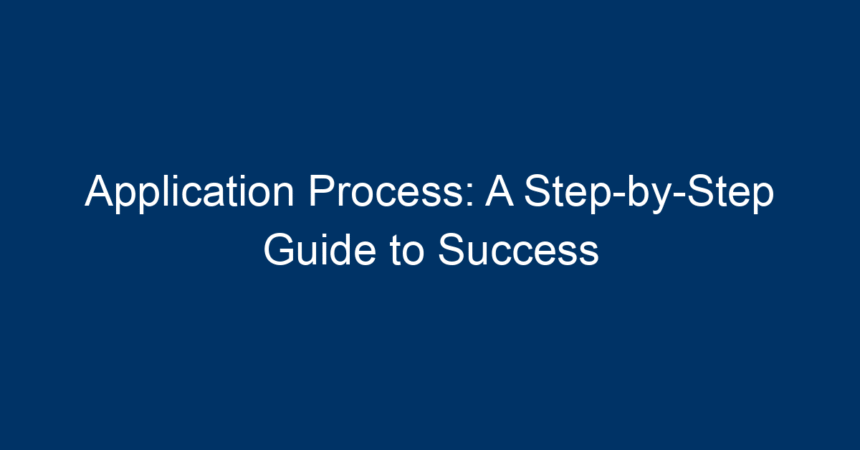Navigating the application process—whether for a job, school, or any other opportunity—can often feel overwhelming. With high stakes and numerous details to consider, it’s vital to approach this journey with a clear strategy. This comprehensive guide will not only illuminate the key steps involved in the application process but also provide actionable tips to ensure you stand out and succeed.
Understanding the Application Process
The application process refers to the series of steps one must take to apply for a position, program, or opportunity. This can vary significantly depending on the field and specific requirements. Understanding this process is crucial in presenting yourself as an ideal candidate.
Why Is the Application Process Important?
Engaging in a well-defined application process serves multiple purposes:
- Demonstrates Competence: Successfully navigating the application process shows your ability to follow instructions, meet deadlines, and present yourself professionally.
- Sets You Apart: In competitive markets, a polished application can distinguish you from other applicants.
- Provides Clarity: A structured approach helps you understand what is required and reduces the chances of mistakes.
Step 1: Research Your Opportunity
Before diving into the application process, thorough research is essential.
Know the Requirements
- Job Applications: Review job postings to understand required skills, qualifications, and responsibilities. Take note of keywords that appear frequently; these often reflect what employers value most.
- Academic Programs: Check prerequisites, course offerings, and faculty expertise. Understanding the graduate program’s focus can tailor your application to emphasize your relevant experiences.
Explore the Organization
Learning about the organization—its culture, mission, and values—will not only inform your application but will also empower you during interviews.
Step 2: Prepare Your Documents
Having your application materials ready is a crucial part of the application process.
Crafting an Impressive Resume
- Tailor Your Resume: Customize your resume for each application. Highlight experiences and skills that are most relevant to the specific opportunity.
- Keep It Concise: A one-page resume is typically ideal for entry-level positions, while experienced candidates may extend to two pages. Use bullet points for readability.
- Quantify Achievements: Wherever possible, use numbers to denote success (e.g., “Increased sales by 20% over six months”).
Writing a Compelling Cover Letter
A cover letter allows you to express your personality and motivations.
- Address the Right Person: If possible, address your letter to a specific individual rather than using a generic salutation.
- Connect Your Story: Share relevant personal stories that relate to the opportunity while illustrating how you meet the qualifications.
- Call to Action: End with a strong statement expressing your interest and asking for an interview.
Step 3: Complete Application Forms
Filling out application forms is often required in the application process.
Be Thorough Yet Concise
- Follow Instructions: Pay close attention to directives like word limits and format requirements. Submit your form exactly as instructed.
- Proofread: Errors can undermine your professionalism. Double-check spelling, grammar, and formatting.
Use Keywords Strategically
Integrate keywords from the job description or program requirements into your application forms. This not only reflects your understanding but might also help your application get through automated screening processes.
Step 4: Prepare for Interviews
Once your application is submitted, the interview is the next significant hurdle in the application process.
Practice Common Interview Questions
Familiarize yourself with common interview questions and rehearse your responses.
- Behavioral Questions: Prepare for questions that ask you to describe past experiences, focusing on skills and competencies.
- Role-Specific Queries: Anticipate technical questions or challenges based on the specific role or program.
Develop Your Questions
Prepare thoughtful questions to ask your interviewer. This shows your interest and engagement and allows you to gauge whether the opportunity is the right fit for you.
Non-Verbal Communication
Consider how you present yourself in terms of body language, attire, and demeanor. First impressions matter significantly, and you want to convey professionalism right from the start.
Step 5: Follow Up
After interviews or significant milestones in the application process, following up can set you apart.
Sending a Thank-You Note
Sending a personalized thank-you email is a great way to keep the lines of communication open and to express your gratitude for the opportunity.
- Be Prompt: Aim to send your thank-you note within 24 hours.
- Reiterate Interest: Reaffirm your enthusiasm for the role or program and briefly recall a highlight from the interview.
Step 6: Await the Decision
Once you’ve completed the application process, it’s time to wait for the decision.
Handling Rejections
Not every application will result in success, and that’s okay. Use rejection as a learning opportunity:
- Ask for Feedback: If possible, inquire about areas for improvement. This feedback can be invaluable for future applications.
- Keep Trying: Persistence is key. Analyze your application, refine your approach, and apply again.
Embracing Offers
If you receive an acceptance or job offer, celebrate your success! However, ensure the opportunity aligns with your goals.
Actionable Insights for a Successful Application Process
- Start Early: Give yourself ample time to research, prepare documents, and practice.
- Seek Feedback: Have peers or mentors review your application materials.
- Stay Organized: Use checklists to track deadlines and documents required for multiple applications.
- Network: Leverage connections within the industry or academic field to gain insights and possibly secure referrals.
In summary, approaching the application process with a strategy can significantly enhance your chances of success. By researching thoroughly, preparing meticulously, and following through with professionalism, you equip yourself with the best tools for achieving your goals. Embrace the journey and remember that each application is a step towards your future aspirations!




